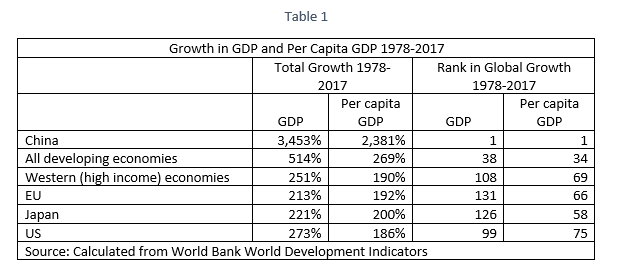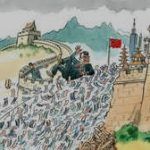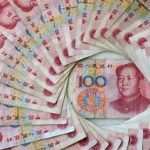Major events, such as the Trump administration launching tariff aggression against China, inevitably ruthlessly cut away hollow rhetoric and allow the objective facts of a situation to be seen – including revealing how the different forces in a situation really judge it. A particularly striking example of this principle, with deep implications not only for China but for all countries, is that the reasons given by the Trump administration for launching its trade war against China in fact entirely destroy that administration’s own propaganda that socialism is ‘inefficient’ in promoting economic development compared to capitalism. In reality the Trump administration is forced in practice, as will be shown, to acknowledge that China’s socialism is more effective as a path of economic development than capitalism.
It is certainly deeply ironic that President Trump, an avowed supporter of capitalism, is forced in practice to acknowledge the superiority of China’s socialist system – he is certainly not himself aware he is making this admission! But this reality is immediately demonstrated by the Trump administration’s own claim that China has an ‘unfair’ economic advantage due to the consequences of China pursuing a socialist economic path of development. It is therefore equally ironic that neo-liberal commentators in China attempt to claim capitalism is more efficient than socialism at the time when the Trump administration is forced by economic reality to admit the exact opposite.
This fact that the Trump administration, and large parts of the Western media, are themselves unaware that they are stating the superiority of China’s socialist economic system has no bearing on the objective content of what they are admitting. But examining this contradiction between the Trump administration’s propaganda claims, and the reality it is forced to recognise, casts an important light on the superiority of a socialist economic system compared to a capitalist one.
This article, therefore, examines this gap between what the Trump administration is forced to admit in reality and its propaganda. Given such a contradiction, analysing the logic of Trump and Western media statements, and their internal contradictions, also therefore confirms the practical correctness of China’s socialist choice of development.
But, as will be seen, the issues involved in this economic choice between socialist and capitalist paths of economic development, and of the outcome of the Trump administration’s trade aggression against China, are crucial not only for China itself but for all countries – indeed for humanity as a whole. Furthermore, they give a particularly striking and direct confirmation of one the most important principles of Marxism. Therefore, the internal contradictions in Trump’s and similar claims merit examining in detail – after all, when an opponent of socialism is forced in fact to admit the economic superiority of the socialist system this is something worth analysing and thoroughly understanding!
Slowing China
That the aim of the Trump administration’s tariffs against China is to slow China’s economic development is now either scarcely concealed, or is openly admitted, by both that administration and by anti-China sections of the Western media. Numerous examples could be used to illustrate this so simply two especially prominent ones will be taken for examination here – all similar claims have the same logic.
- Taking first a leading example from the media, on 18 October, The Economist carried a long cover story ‘The End of Engagement’ that noted: ‘America fears that time is on China’s side. The Chinese economy is growing more than twice as fast as America’s and the state is pouring money into advanced technology, such as artificial intelligence, quantum computing and biotech. Action that is merely daunting today… say… to challenge China in the South China Sea—may be impossible tomorrow.’
- Speaking in August, President Trump himself declared: ‘When I came [to office] we were heading in a certain direction that was going to allow China to be bigger than us in a very short period of time. That’s not going to happen any more.’
However the reality is that facts show, as analysed earlier in Trump’s Economy – Cyclical Upturn and Long Term Slow Growth that the Trump administration has failed to significantly accelerate the US economy’s growth rate. In fact, the opposite situation exists:
- Peak growth under Trump is the lowest under any US president since World War II.
- US growth during the whole of the current business cycle is the slowest during any business cycle since World War II.
As the Trump administration has been unable to substantially accelerate US growth, therefore the only method available to it to prevent China being ‘bigger than us in a very short period of time’ is to slow China’s development. This is, of course, the reason for the Trump administration launching trade aggression against China.
What Trump is in reality admitting
To achieve this goal of slowing China’s economy the common core demand that President Trump’s administration makes is that China’s state should not intervene in the economy – seen notably in its call for China to abandon SOE’s, the attack on state economic priorities in ‘Made in China 2025’ etc. All these are claimed to give China an unfair advantage in competition with the US.
It is, indeed, perfectly true that China’s state strategically intervenes more in its economy than the US state does in the US economy. That is, as Xi Jinping put it, China uses both the ‘visible hand’ and the ‘invisible hand’ to develop its economy. In contrast, the modern US economy attempts to rely almost exclusively on the ‘invisible hand’. China’s preparedness to use both visible and invisible hands is indeed, of course, a feature flowing from its socialist economic system.
But the contradiction between the Trump administration’s verbal propaganda claims of the efficiency of capitalism, and its actual practical positions regarding the trade war, becomes evident the moment the actual content of Trump’s claims is thought about. Because Trump’s claim that China has an unfair economic advantage simply completely contradict the US propaganda claim that socialism is less efficient than capitalism! For if state enterprises and state intervention in the economy, as part of a socialist system, were less efficient in promoting growth than private capitalism their use would not be an unfair advantage for China – on the contrary state intervention and state enterprises would be a serious disadvantage for China.
If state intervention in the economy, including state enterprises, were really less efficient than capitalism then in fact the best way for the Trump administration to slow China’s economic development would be to call for China to maintain its state intervention in the economy, or even to increase it – not for China to abandon its unfair advantage of state intervention! If state intervention in the economy were really less efficient than private capitalism the greater the state intervention in the economy the slower China’s economy would grow – SOEs, for example, should be a disadvantage for China’s economy not an unfair advantage.
The fact that Trump/The Economist etc claim that state intervention gives China an unfair advantage is therefore in fact an admission that such socialist policies are an economic advantage, not a disadvantage, for China. Naturally Trump and The Economist cannot state this openly, as this would entirely overturn their argument that socialism is less efficient in creating economic development than capitalism. Indeed, so confused are Trump/The Economist, and lacking in self-awareness and understanding of their own arguments, that they certainly do not understand themselves that they are admitting the superiority of socialism in creating economic development. But that is the inevitable and inescapable conclusion of their argument that China is obtaining an unfair advantage by state intervention in the economy – that is, of China’s willingness to use both the visible and the invisible hands in economic development.
The implications for the US
Furthermore, the implications of this de facto admission that socialism gives an advantage in economic development compared to capitalism for the US are obvious and, if considered rationally, produce the exact opposite conclusion to the one the Trump administration advocates. Their logic is that rather than asking China to abandon the unfair advantage of state enterprises and state intervention in the economy, if state intervention in the economy and state-owned enterprise gives China an unfair advantage, allowing its economy to grow more rapidly than the US, then it is urgent for the US to establish SOEs and undertake state intervention in the economy – thereby allowing the US economy to gain the same advantages as China and grow more rapidly! The reasons why the US will not do this are analysed below but, in turn, this allows the real choice facing not only China and the US but all countries to be clearly understood. For what Trump/The Economist, and similar arguments, are in fact admitting is:
1. As they claim state enterprises and state intervention give China an unfair advantage, they are therefore are in reality admitting that a socialist economic system has an unfair advantage compared to a capitalist one – that is why Trump/The Economist demand that China abandon this unfair advantage of its socialist economic system.
2. But if countries adopt a capitalist system, and therefore do not make use of the unfair advantage of a socialist economy, they will grow more slowly. Therefore, what Trump/The Economist are asking is that countries do not adopt the unfair advantage of a socialist economy but instead that they should have a capitalist economy and therefore accept to develop their economy more slowly – i.e. in fact Trump/The Economist argue that the issue of maintaining a capitalist economic system should take priority over the most rapid possible course of economic development.
Speed of China’s economic development
To understand this issue in practice, it is certainly factually true that the admission by Trump/The Economist of the advantage for speed of development of China’s socialist system, compared to a capitalist one, is accurate – as is easily shown by international comparisons.
To summarise the results of the period of development of China’s economy during the construction of a socialist market economy compared to capitalism, from 1978 to the latest available data there are 155 countries, regions or income groups for which there are GDP and per capita GDP data for the period 1978-2017 by standard World Bank classification. As shown in Table 1, during the period 1978-2017, that is the period of China’s socialist market economy, China’s economic growth ranked number one internationally among all countries, regions or income groups. In terms of international comparison China’s GDP growth was:
- Almost 13 times greater than the US.
- Over 12 times greater than the EU.
- Almost 16 times greater than Japan.
- Almost 7 times faster than the average for developing economies – the overwhelming majority of which are capitalist.
Taking the criteria of per capita GDP growth, as well as total economic growth, China equally ranked number one. In 1978-2017 China’s total per capita GDP growth was:
- Almost 13 times that of the US.
- Over 12 times that of the EU.
- Almost 12 times that of Japan.
- Almost 9 times that of all developing countries.
In summary, China’s socialist path of economic development showed overwhelming superiority in generating economic development to that of capitalism – whether capitalism is considered in advanced or developing economies.
The Trump administration/The Economist are therefore quite correct to acknowledge the superiority of the results for economic development of China’s socialist system compared to capitalist alternatives. But then it is entirely illogical for them to argue that China should abandon a socialist system, delivering more rapid economic development, and instead adopt a capitalist one which produces slower economic development. The logical choice is for countries growing more slowly to switch to the system producing the most rapid economic development, not for countries enjoying rapid economic development to switch to a system which produces slower growth!

Consequences for humanity
Finally, in order to understand the significance of these issues, and this choice, not only for China but for the whole of humanity it should be clearly grasped that the question of the rate of economic development is not simply, or even primarily, important in terms of ‘concrete and steel’ – that is physical indicators of output. Economic development has overwhelming implications for the social conditions of every country, for national well-being, and for humanity as a whole. Economic development remains the decisive issue confronting most countries – only 17% of humanity currently lives in ‘high income’ economies by World Bank international classification, that is economic development remains the decisive issue for 83% of humanity, and the consequences for the overall well-being of human beings, and of national wellbeing, of economic development is overwhelming.
Taking simply average life expectancy, which is known by economists to be the most significant indicator of overall living and social conditions:
- The difference in average life expectancy between a high-income economy and a low-income economy by international standards is 18 years.
- The difference in average life expectancy between an upper middle-income economy by international classification, such as China, and a high income one is over five years.
Therefore, achieving economic development is the key to improving social living conditions. For countries to abandon, or fail to adopt, the unfair advantages of a socialist economic system is therefore literally a life or death question for their citizens. What Trump is demanding by attempting to slow China’s economy is not simply that China should not achieve economic development, but that China should literally condemn its citizens to die earlier than is necessary. Equally, those who claim that countries should not make use of the unfair advantage of socialist development, or attempt to force countries to abandon them, are in fact condemning the majority of humanity to needless backwardness, suffering, and an unnecessarily early death.
Implications for other countries
These real social implications of economic development therefore show why the consequences of the choice of a socialist path of development is of decisive significance not just for China. It is why in defeating the US trade aggression against China the interests of humanity are on the side of China because:
- China’s rapid economic development creates a stronger global economic dynamic which in turn aids other countries development – while, equally, US success in slowing China’s economy would therefore make it harder for other countries to pursue their own economic development.
- China has created the world’s most successful path of economic development. No other country can mechanically copy China’s development, but they can learn from it. Success by the Trump administration in blocking China’s socialist path of development would therefore be a setback for every country.
Indeed, the implications of the outcome of the US trade aggression against China go further even that straightforward economics. The US has repeatedly shown that it is prepared to use military force against weaker countries (Iraq, Libya) to engage in de facto military threats even against powerful countries (expansion of NATO up to the borders of Russia, supply of arms to the separatist leaders of Taiwan Province), and to use the unilateral imposition of economic sanctions (Russia, Iran). Success of the US in trade aggression against China would therefore undoubtedly strengthen such US military and geopolitical threats. Detailed analysis of this, however, would take a further full article so here merely the economic logic of the Trump administration’s positions are considered.
The relation of national development and business development
Returning to this purely economic aspect, if those such as Trump/The Economist cannot see that by their claim that China has an unfair economic advantage that they are in reality acknowledging the superiority of the socialist system why are they blind to the logic of their own argument? Because in reality they place class values, those of the capitalist class, above those of the nation or of humanity. Thereby, despite their own wishes, they are in fact forced to confirm one of the most important arguments of Marxism.
This is shown clearly in a criticism of China such as The Economist‘s claim that:
‘Mr Trump is… right that America needs to reset expectations about Chinese behaviour. Today’s trading system fails to prevent China’s state-backed firms from blurring the line between commercial interests and the national interest.’
This alleged confusion by China between ‘national interests’ and ‘commercial interests’ is part of The Economist’s criticism of China’s SOEs. Therefore a criticism that China’s SOEs allow the ‘national interest’ to influence the ‘commercial interest’, and that when there is a conflict the SOE’s place the national interest above the commercial interest. By this, obviously, there is an acknowledgement that in certain situations there may be a conflict between national interests and purely commercial interests.
But if there is a distinction between the ‘national interest’ and the ‘commercial interest’, and The Economist admits there may sometimes be conflicts, which should take precedence? What most people, including in China, would want is that when such conflicts occur the national interest is placed first. The Economist, however, on the contrary makes it a criticism for the national interest to come before the commercial interest. That is, for The Economist the ‘commercial interest’ must come before the ‘national interest’.
But what is this ‘commercial interest’ The Economist is so concerned with? In the West it is, of course, the interest of private capitalist companies – which dominate the Western economies. Therefore, what The Economist is arguing is that the capitalist interest of companies, that is the interests of the capitalist class, should come before the ‘national interest’.
This concept is precisely why the Trump administration/The Economist argue China must not use the unfair advantage of utilising both the visible hand and the invisible hand, that is both the market and state intervention in the economy. The Economist, in line with the Trump administration, are criticising China from the point of view of a framework that in the event there is any conflict between the ‘national interest’ and the ‘commercial interest’, that is between the national interests and the interests of the capitalist class, then the interests of private capitalism must come before the national interest. It is precisely because it has the opposite framework, that the national interest must take precedence of the interests of private capitalism, that allows China’s economy to develop more rapidly than a capitalist economy. The Economist however, in line with the Trump administration, argues capitalist class interests come first – even if this produces slower economic development.
Ironically therefore, although they certainly do not intend to do it, the Trump administration/The Economist in fact prove Marx’s famous formula classically expressed in his Preface to the Critique of Political Economy: ‘At a certain stage of their development, the material productive forces of society come in conflict with the existing relations of production, or – what is but a legal expression for the same thing – with the property relations within which they have been at work hitherto. From forms of development of the productive forces these relations turn into their fetters.’
By arguing that the ‘commercial’, that is the capitalist, interests must come before the national interest, the unfair advantage the Trump administration/The Economist claims that China has is precisely its socialist economy – and its advantages compared to a capitalist economy. What the Trump administration/The Economist are in fact arguing is that countries, starting with China, should not use the advantages of a socialist system but should reduce their rate of economic development to a level compatible with the interests of the capitalist class. In summary the Trump administration/The Economist are, without understanding it, expressing in a completely classical form the contradiction between the class interests of capital and the interests of humanity.
Conclusion
To summarise. From the point of view of China this link between its socialist path of its development and its national rejuvenation concerns the well being of the Chinese people and the Chinese nation. Despite the People’s Republic of China’s gigantic achievements, China started its development from a position where in 1949, after a century of foreign intervention, China was virtually the world’s poorest country – less than 10 countries had a lower per capita GDP than China and its life expectancy was 35. With such a low starting point even the internationally and historically unparalleled economic development created by China’s socialist reform and opening up takes a prolonged period to achieve prosperity for the Chinese people – it will still be two years before China achieves ‘moderate prosperity’ by its national standard and around five years before it achieves the status of a ‘high income economy’ by international World Bank standards. Even with the speed of development of its socialist market economy it will be several decades before China’s living standards reach the highest in the world. The abandonment of the socialist path of development, the acceptance of the demands by the Trump administration, or anyone else, that China abandon its more economically successful path of socialist development, and adopt the slower one of capitalism, would therefore be a catastrophe for the Chinese people and the Chinese nation. It would, as in the former USSR when it adopted capitalism, inevitably lead to the growth of separatism and other deadly threats to the Chinese nation. Experience shows that the weakening of China would encourage the most militarist and other dangerous forces within the US.
But while this issue of the path of development will, of course, be determined by the issue of China’s own national development its consequences will affect every other country. That is why the interests of other countries, and of humanity, coincide with those of China in countering the trade aggression of the Trump administration.
In summary the advantages of China’s economic system only appear ‘unfair’ to the US because the US refuses to embark on a socialist path and clings to the slower path of economic development of capitalism. But in that case why should China abandon a more successful path of economic development – as the deeply illogical demands of the Trump would result in?
There is indeed a deep irony. In its empty rhetoric and media propaganda the Trump administration proclaims the superiority of capitalism and the inefficiency of socialism. But in its practical actions the Trump administration is forced to acknowledge the economic advantage of socialism. Which of these two should be taken more seriously?
As the wise English method of judging says – actions speak far louder than words.
* * *
This article was originally published in Chinese at Guancha.cn on 28/11/2018.







No one system is perfect. Socialism exists in the USA in the form of medicare and other institutions that are state run. The USA seems to think of (Boogy man) Socialism as the next step to communism. Kinda stupid really. No system is immune to corruption and all that goes with it, nor to stupidity and the inability to see the benefit in diversity of ideologies.
China practices its unique socialism compared with other socialist or communist countries which has/had failed miserably compared to Western capitalism. Mao Zedong had used the China wisdom, culture and unique disposition of farmers and the rich/powerful to formulate China communism. Deng Xiao Peng had used the same criteria with additional empowerment to the intellectuals and technocrats to govern the country. The result is phenomenal and being loathed by Western countries. That is why the Chinese leaders keep reiterating the unique socialism with the China content. Ant it does not want to teach or duplicate the system in other countries as it is impossible to replicate the model. China is unique!